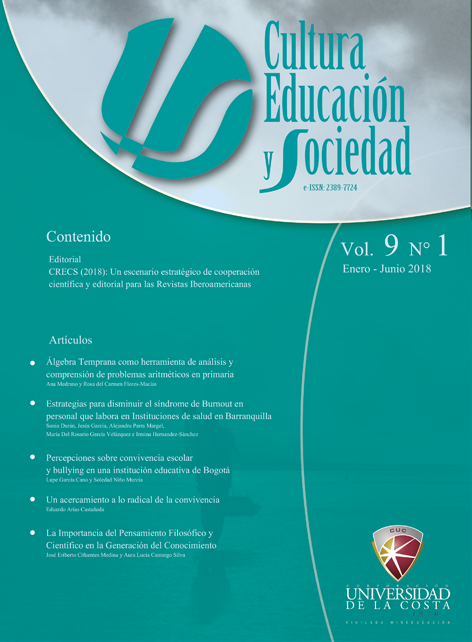Healthy habits through research as a pedagogical strategy in basic education
DOI:
https://doi.org/10.17981/cultedusoc.9.1.2018.11Keywords:
Healthy habits; research as a pedagogical strategy; basic educationAbstract
Promoting health at school is part of a comprehensive vision of the human being that considers people. Health education is being involved in the different dimensions of the formation of being in a transversal articulation with the different areas of knowledge that are part of the educational curriculum, and its impact both within schools and in their homes. The study sought to promote healthy habits through research as a pedagogical strategy in basic education. Approached under the guidelines of the IEP, with a design based on the trajectories of inquiry, using techniques of qualitative and quantitative research necessary for the collection of information. It is concluded that the free time habits of students have changed due to the technological development of leisure, these modifications, in addition to their advantages, also have disadvantages because they favor the appearance of sedentary lifestyle.
Downloads
References
Camargo, C. (2015). La investigación como estrategia pedagógica en la Guajira, desde una perspectiva de la inclusividad y diversidad como nuevo paradigma para el desarrollo de ha-bilidades, destrezas y competencias. Educación y Ciudad, (29), 149-162.
Coll, C. (1987). Estilos de vida en estu-diantes del área de la salud de Buca-ramanga. Universidad de Antioquia Colombia.
Congreso de la Republica. (1993). Ley 100 de 1993.Congreso de Colombia. (1993). Ley 99 de 1993. Política Ambiental Colombiana.
Congreso de Colombia. (1995). Ley 181 de 1995. Ley del deporte.
Constitución Política de Colombia (1991). Art. 52. Ejercicio del deporte.
Cruz, M., & Carmona, M. (2014). Competencias argumentativas en estudiantes de educación superior. Revista Internacional de Ciencias Sociales y Humanidades, SOCIOTAM.
Decreto 1860 de 1994 Ministerio de Educación de Colombia.
Iafrancesco G. (2003). Nuevos fundamentos de transformación curricular. Bogotá Ed. Magisterio.
Pérez, R., & Víquez, D. (2010). Los grupos de discusión como metodología adecuada para estudiar las cogniciones sociales. Actualidades en Psicología.
Mariño, G. (2010). El diálogo en la educación de jóvenes y adultos. Dos propuestas pedagógicas para implementarlo. En el taller dialógico/la recuperación de experiencias laborales. Bogotá. OEI.Mejía, M., & Manjarrés, M. (2010). Las pedagogías fundadas en la inves-tigación. Búsquedas en la reconfi-guración de la educación. Revista Internacional Magisterio 42: 16-26. Colombia.
Murcia J. (1997). El proceso del conoci-miento. Bogotá. Universidad Santo Tomás.
Ministerio de Educación Nacional. (1994). Ley 115 de Febrero 8 de 1994.
Ortega, P., Peñuela, D & López, D. (2009). Sujetos y prácticas de la pedagogía crítica. Ediciones El Búho. Bogotá.
OMS. (2010). Recomendaciones Mundiales sobre Actividad Física para la salud. [en línea]: http:// www.who.int/rpc/guidelines. (Consulta: 08/11/17).
Picardo, O., Balmore, R., & Escobar, J. (2004). Diccionario enciclopédico de ciencias de la educación. San Salvador: El Salvador.
Roca, M. (2016). Estrategias de intervención para el desarrollo autónomo en comportamientos saludables. Cultura Educación y Sociedad, 2(1).
Sacristan G. (2008). Comprender y transformar la enseñanza. Morata. España.Stenhouse L. (1984). Investigación y desarrollo del currículum. Morata. Madrid.
Schnettler, B. (2013). Eating habits and subjective well-being among universi-ty students in southern Chile. Nutricion Hospitalaria, 28(6), 2221-2228. doi:10.3305/nh.2013.28.6.6751
Downloads
Published
How to Cite
Issue
Section
License
Copyright (c) 2018 CULTURA EDUCACIÓN Y SOCIEDAD

This work is licensed under a Creative Commons Attribution-NonCommercial-NoDerivatives 4.0 International License.
![]()
Creative Commons 2020 CULTURA EDUCACIÓN Y SOCIEDAD
This article is under international license Creative Commons Reconocimiento-NoComercial-SinObrasDerivadas 4.0.
The published articles are the sole responsibility of their authors and do not necessarily reflect the opinions of the editorial committee.
CULTURA EDUCACIÓN Y SOCIEDAD respects the moral rights of its authors, who assign to the editorial committee the patrimonial rights of the published material. In turn, the authors inform that this work is unpublished and has not been previously published.
All articles are under a:
Licencia Creative Commons Atribución-NoComercial-SinDerivadas 4.0 Internacional.
![]()


 English
English
 Español (España)
Español (España)




_12.53_.27_p_. m_._3.png)





_12.57_.35_p_. m_._3.png)
_12.50_.37_p_. m_._3.png)



